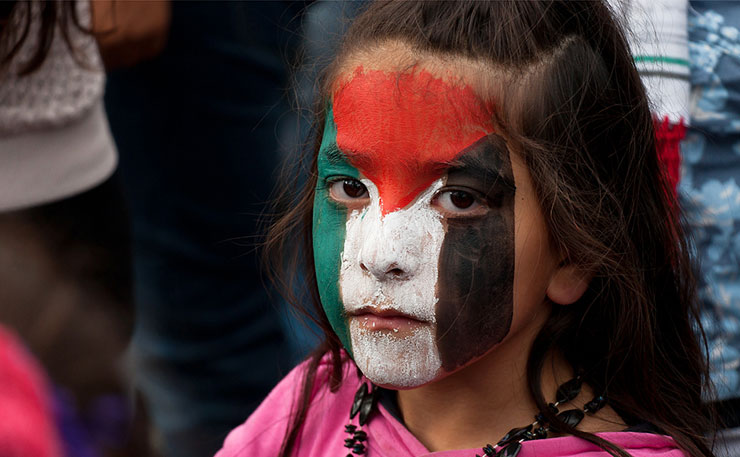In common thinking, we believe women to be strangers to war. Although they are generally far from the battle lines, in most cases they bear the full brunt of the conflicts, becoming in many cases victims of rape, violence and torture, deportations and massacres, as well as the poverty that every conflict brings.
Women and children, as well as the elderly, are the first to witness the destruction of homes and entire cities.
But it was women who kept the countries going while the men were at the front and who raised them up once the conflict was over.
Palestinians, in this respect, can be seen as part of a genealogy of women in struggle. Since we often hear about the subaltern condition in which women live in Islamic countries, many are unaware that in Palestine they started to claim freedom and rights a long time ago, driven largely by the state of siege of the Israeli occupation. Ever since Palestine was occupied by the Zionists, it has become a kind of open-air prison whose borders are militarily controlled by Israel. The state of constant oppression in which the population has been forced to live for decades prevents the development of the most basic civil rights, and this has repercussions on the path to women’s emancipation, which is deeply hindered.
The very first uprising of Palestinian women against the construction of a Jewish colony took place in 1893 in the village of Afula; since then they have been at the forefront of the fight against land confiscation, even when Israel legally expropriated all grazing land from Palestinians.
Although no form of association was allowed from 1948 to 1967, the women became part of an underground pan-Arab organisation, oriented towards the dictates of Arab socialism, which fought for equality for all inhabitants of Israel.
The situation of Palestinian women is dramatic because they are double victims: on the one hand, of a strongly patriarchal society that considers them as the property of men and perpetrates sexual discrimination and violence on them, and on the other hand, of militarisation and occupation. In many cases, women find themselves trapped in a bureaucratic system that makes it impossible to convict those responsible for crimes committed against them.
For some time now, women have been fighting for the annulment of the current Law 99, taken from the Jordanian legal system, which provides extenuating circumstances for perpetrators of honour crimes, with reductions in the sentences of those accused that allow them to go free in a very short time.
National consciousness, the struggle for independence and individual and female emancipation have always gone hand in hand in Palestine, as if, within a similar context, the parallelism between the struggle for national and female liberation had become a necessary action. To the cry of ‘Free Homeland, Free Women’ – ‘There is no free nation without free women’ – women filled the squares of various cities – in Jerusalem, in the West Bank, in Lebanon, and they also joined in from London and Berlin.
The fact that the repression of Palestinian women takes place at multiple levels has led to a growing awareness that all forms of oppression are closely interconnected. They are fighting as feminists and as activists, against the military occupation and the Palestinian social conventions, putting their bodies and their lives on the front line when they challenge the armed soldiers. But they are no longer willing to accept that the two remain separate, their own freedom and that of the nation. Most of all, they are no longer willing to sacrifice or postpone even one day their freedom for the sake of national freedom, as it has been the case for too long because of the most pressing demands of the occupation.
Once again, Palestinian women are renewing their resistance and their transversal struggle against patriarchy, gender violence, colonialism and segregation, but above all against marginalisation of any kind.
For some time now, Palestine has been going through a process of renewal that is putting women’s rights, gender diversity and sexual orientation at the centre of the political debate. Despite living in a theatre of war and bombings, people dream of a free life and try to achieve it by any means possible. In order for these protests not to be in vain, feminism must become a common language, because the construction of a more just, ethical and egalitarian society passes through a collective awareness and the responsibilities of each individual, necessary to question the entire system.

